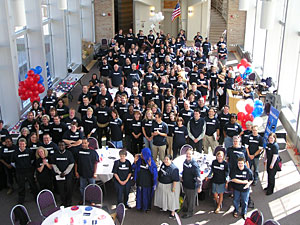Photos
Your Voice
| |||||||||||||||||||||||||||||||||||||||
Non-profits try to mobilize voters
September 9, 2004
 |
| Organizers kicked off the November 2 drive with a rally. (MPR Photo/Laura McCallum) |
St. Paul, Minn. — A few hundred people who work at non-profit organizations gathered at Metropolitan State University in St. Paul to kick off the "November 2" campaign.
They say they can reach thousands of Minnesotans who've never voted, either because no one asked them, or they didn't know how, or didn't think it was worth their time.
 | |||
Tene Wells, president of WomenVenture, says many non-profits serve people who feel disenfranchised by the political process.
"We know the unwanted voters, and we can get them to vote. As a matter of fact, not only can we, but we will get them to vote," she said.
Wells talked about her grandmother, who just turned 104, and described her grandmother as an unwanted voter.
"My grandmother says that this is the most important election of her lifetime. And as a matter of fact, she's also said that she's going to live past November 4, because she's going to vote. She's told me that herself personally. And she says she will not die until she cast her vote on November 2," she said.
Non-profit leaders say their job is to persuade the people they serve to take their right to vote that seriously. Marcia Avner, public policy director for the Minnesota Council of Non-profits, says non-profits work with many groups with traditionally low voter turnout.
"We know that people who are low-income, people who have lesser degrees of education, people who are unfamiliar with the voting process -- even women -- have not voted their numbers in past elections," according to Avner.
Avner says the November 2 campaign aims to recruit 500 non-profit volunteers to knock on doors, register voters and drive people to the polls on election day. One of the groups participating in the campaign -- Minnesota ACORN -- has already registered 34,000 new voters, about triple that of the last election.
Organizer Becky Gomer says this election is critical for the people she works with.
"It's really important that the voices of low-income people and the issues that low-income people care about are heard, like more money for education and more money for health care and the kind of crisis with housing, and affordable housing and we could go on and on," Gomer said.
ACORN and other non-profits are prohibited from participating in partisan activities, by nature of their tax-exempt status. They say they talk to voters about issues, not specific candidates. But the issues they stress tend to favor Democrats, according to political scientist Chris Gilbert of Gustavus Adolphus College in St. Peter.
"When you think about the kinds of groups involved here, what their issues are, what level especially of government activity they might like to see, what level of investment in services, especially in an era where much of that investment has been cut back, you would have to conclude that the likely outcome would be support for the Democratic Party," Gilbert said.
On the other hand, Gilbert says some religious non-profits may support the Bush administration's call for more funding for faith-based programs. Four years ago, when Democrat Al Gore carried Minnesota in the presidential race, just 58,000 votes separated Gore and Bush.
Gilbert says if the non-profit campaign is successful in getting thousands of new voters to the polls, it could play a role in what may again be a tight presidential race in Minnesota.
|
News Headlines
|
Related Subjects
|

